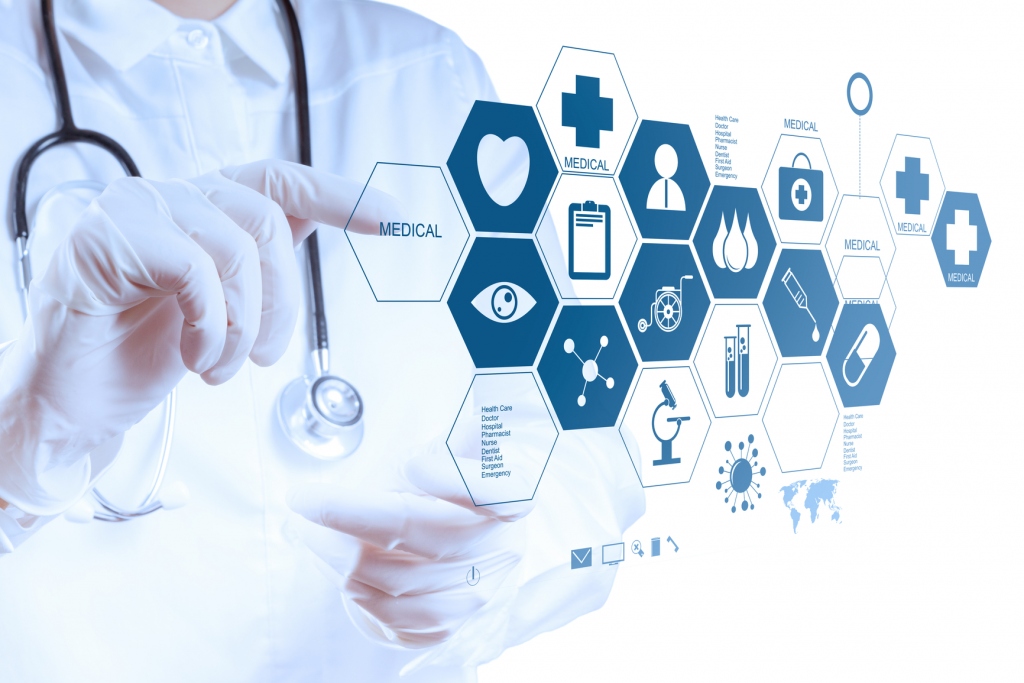Digital innovations have made great advances in healthcare possible in an amazingly brief timeline. Until recently, the rapid forward pace of technology had limited impact on medical science, but now medicine is about to undergo the biggest changes in its history. In this new era of medicine, physicians can monitor vital metrics like blood pressure at all times while patients are asleep, at work, or in the throes of emotional crises.
A few of the many innovations in medical technology over the past year:
- NXT Health is updating hospital room design to eliminate redundancy and clutter and to integrate changing technology more easily with interchangeable parts easily adaptable to specific patient situations.
- Roswell Park Cancer Institute and the University of Buffalo School of Engineering and Applied Sciences have created a robotic surgery simulator that eliminates the need for live patients for surgical training sessions.
- The diagnostics firm Theranos has designed a way for clinical laboratories to perform their tests with microsamples of blood a thousandth the volume of traditional and typical, current samples. This innovation will improve patient experience and cut lab test costs.
- With “clustered, regularly interspaced, short, palindromic repeats” (CRISPRs), scientists can edit genomes more precisely, efficiently, and flexibly than ever. They have created monkeys with mutations to prevent human immunodeficiency viral infections in human cells. Chinese scientists have applied the technique to nonviable human embryos in efforts to develop a CRISPR cure for any genetic disease.
- The first successful mitochondrial deoxyribonucleic acid (DNA) transplants occurred in the late ’90s, and now these procedures promise better treatment for genetically-related diseases. The process, in which parents contribute to in vitro fertilization and a third party contributes the mitochondrial DNA, is approaching perfection and indisputable utility.
- With a new physician-referral service, referralMD, healthcare providers digitally create referrals that reach millions of patients and fellow providers searching for treatment options. Current, paper-based referrals fail 50 percent of patients, who never actually make intended doctor visits, a gap that causes them lose treatment opportunities and providers to lose money. The referralMD application is part of the new health informatics field, which collects, stores, and delivers health data in digital format.
Future Healthcare
Methods of sharing and storing medical records and data are changing as well. These cost-effective changes are technological advancements that improve medical professional abilities to diagnose and treat all medical problems. Three changes driving the future of healthcare are electronic health records, health information exchanges, and the tenth revision of the International Statistical Classification of Diseases and Related Health Problems (ICD-10), a World Health Organization medical classification system.
Electronic Health Records
Medical billing and coding have transitioned from paper- to computer-based formats. Electronic health records make healthcare more efficient and less expensive and improve care by making patient medical histories quickly, safely, and easily accessible to all providers. Physicians access information on all care patients ever have had to identify and diagnose their current complaints with a streamlined process that contains costs.
Health Information Exchanges
Health information exchanges securely share patient medical histories among physicians of all specialties while patients also access data about their own health profiles. According to HealthIT.gov, new payment approaches that stress care coordination and financial economy drive the demand for health information exchanges.
ICD-10
ICD-10 is the latest innovation in diagnostic tools, essentially a global medical system of over 14,000 codes that bill patients and insurers for services with high specificity. In the United States, ICD-10 classification includes additional codes that raise the total to 76,000 ways of processing medical claims. Healthcare facilities must install new software and train staff in ICD-10 guidelines, another area in which skilled health informatics professionals are of high value. The new approaches to medical coding, health information exchange, and billing require specialized databases customized to meet the needs of each physician and medical practice.
Medical Practice Management
Medical practice management systems help physicians with patient demographics, billing procedures, reports, and appointment schedules. Practice management applications can improve clinical workflow efficiency dramatically and boost reimbursements from health care insurers and other providers.
Medical practice management systems are usually on-premises or in-house but may be Internet-based hosted services for regular, ongoing subscription payments while in-house systems usually cost more upfront with lower ongoing maintenance costs. These management systems in combination with electronic medical records comprise fully-integrated electronic medical suites. Cloud practice management software and Internet-based electronic medical records give providers and patients the ability to access patient and practice data from any computer with an Internet connection.
